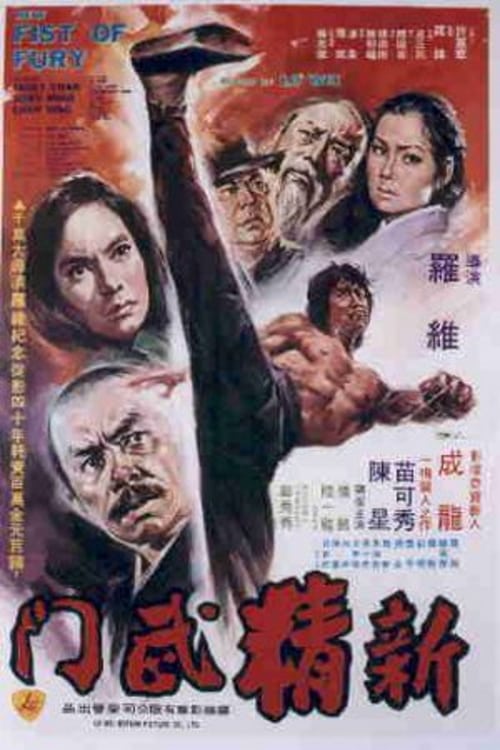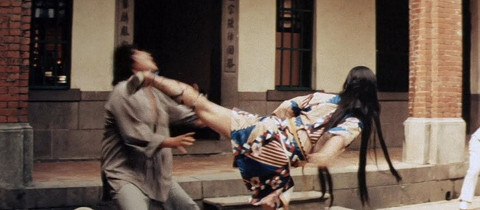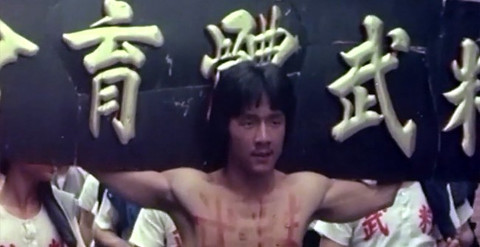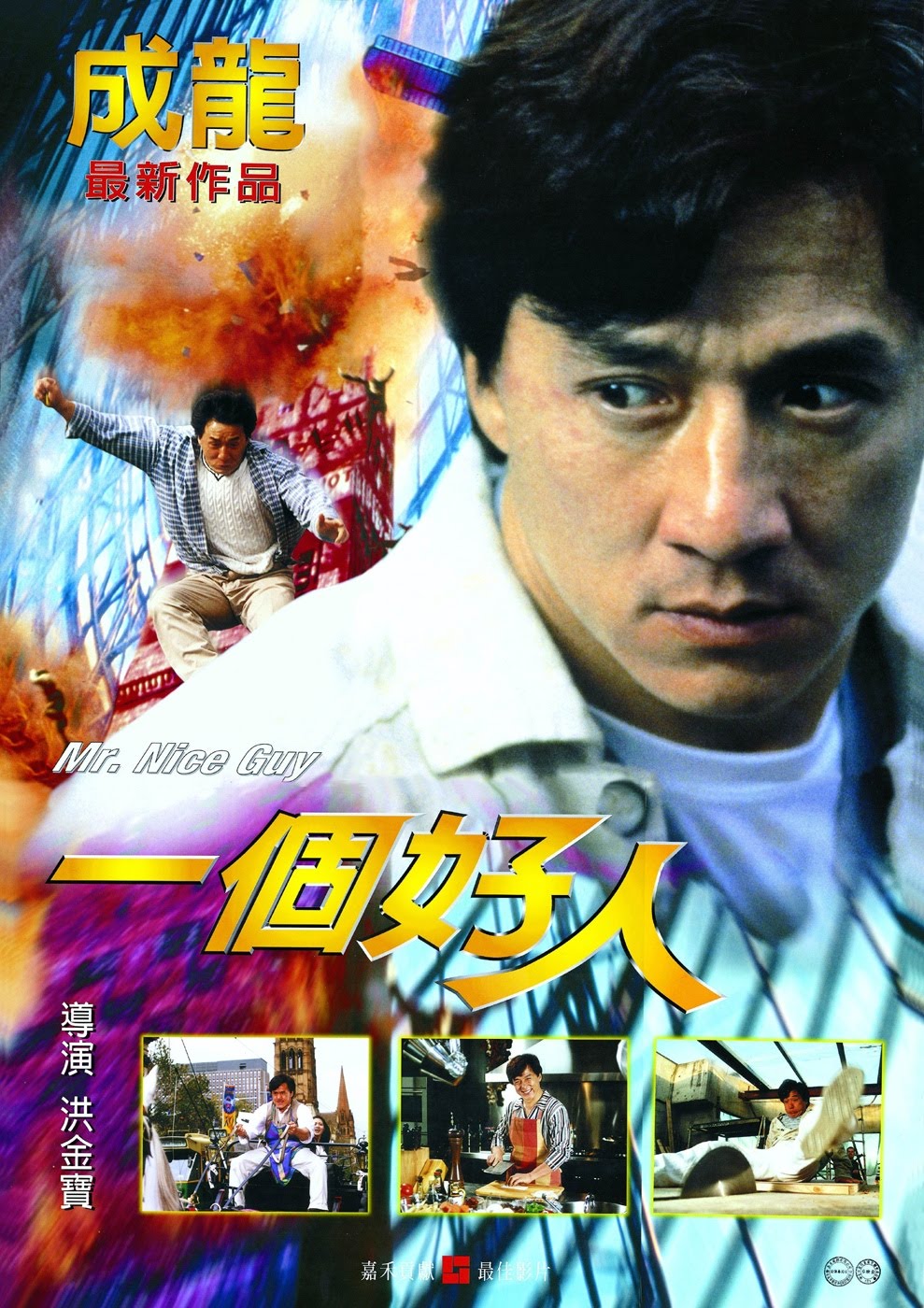New Fist Of Fury (1976)
Directed by: Lo Wei
Written by: Lo Wei, Pan Lei
Starring: Chan Sing, Jackie Chan, Luk Yat-lung, Nora Miao
AKA XIN JING WU MEN
HONG KONG
AVAILABLE ON BLU-RAY AND DVD
RUNNING TIME: 120 mins/ 83 mins
REVIEWED BY: Dr Lenera
The Ching Wu school of martial arts in Shanghai has been closed down and most of its students killed by the Japanese who rule there, including Chen Chao-un who was the very best of them. Survivors Mao Li Er – who was Chen’s girlfriend – and two of her friends escape to Taiwan to stay with her grandfather Master Su. Unfortunately, the Japanese rule there too, and Akumora the provincial leader wants to combine all the Chinese martial art schools under his Di Wah karate school and is prepared to turn nasty in order to achieve this. However, Mao’s initial problem is that a thief by the name of Ah Lung steals a box belonging to Mao which contains Chen’s deadly nunchuku….
If you’re really up to date with Blu-ray releases then you’ll have noticed that I’ve been reviewing all the Jackie Chan film being released by 88 Films, this being part of a a project of my own accord to review all of his films. I’m behind, so I’m going to be posting my write-ups on the three new 88 Films releases all today, starting with this unsatisfying, rather odd but certainly not uninteresting film. A direct sequel to director Lo Wei’s Bruce Lee-starring hit Fist Of Fury, it disappointed me intensely when I first saw it because our hero isn’t even in it very much and, apart from two very early scrapes which he loses, he doesn’t go into action until the last ten minutes – and this in a film that last two hours! It’s never actively boring, but Wei and co-screenwriter Pan Lei pack the film with scenes and even plot elements aren’t always necessary, especially in the full length cut which this review will primarily be of though I’ll describe the short version a bit in the next paragraph. Yet despite its very poor reputation I don’t think it’s that bad; for every weak, clumsy or unnecessary scene there’s a decent one [this seems to be a trademark of Wei as a director], and the performances are generally quite strong; one thing that Wei was often good with was actors. One thing he generally wasn’t so good with was martial arts. Lee directed all the action he was in for his two Wei films, and one sometimes wishes that Wei had given the job to someone else here too except for the rather good final confrontation. As for Chan, he doesn’t look too uncomfortable for the most part, though his acting isn’t that impressive yet. Of course I watched it in the English dub which has several of the expected “but still”s.
More known as a stuntman, Chan had already starred in The Little Tiger Of Canton, but that took two years to creep out to an uninterested public. After co-starring in Hand of Death for no less than John Woo, he retired to Australia, doing construction in the day and working in a Chinese restaurant at night. Then he received a telegram from his manager Willie Chan wanting him to star in a sequel to Fist of Fury for the newly formed Lo Wei Productions and that it would be directed by Wei himself – but Chan had to sign an eight-film contract. He jumped at the chance, though soon became frustrated with Wei not giving him any control over the action despite often listening to horse racing when he should have been focused on directing. A major flop, it didn’t even get a release in Japan; odd, since that country soon became one of Chan’s biggest markets. When Chan finally became big, Wei re-released New Fist Of Fury in this drastically cut form, even cutting out his own cameo so it opened instead with Chan, and removing a great deal of dialogue from the first two thirds. The cutting out of much bad guy footage reduced the political element so much that parts of the storyline weren’t too clear. Two shots of Lee were also removed, and even a small amount of action footage, though Wei also added a few shots and different takes. The shorter version of the film has a much faster pace to it and proves that some of the wordier scenes were just not necessary, though I do feel that Wei went too far in his re-edit. My preferred cut would be something that lies in-between the two versions – and maybe one day I’ll put it together.
So we follow on from Fist Of Fury, and begin with that film’s Inspector Lo played again by Wei, which must be why the simple moment of him going to a house takes ages, though watching it with the excellent picture quality of this Blu-ray I was impressed by the noir-like cinematography amd even atmosphere with its strong use of blacks. One has to remember that these films often looked like shit on video and even DVD. Lo has come to tell Mai and her two friends – one of whom is a wanted rebel – that their passage to Taiwan is ready. Chan’s character Ah Lung is introduced running with his uncle and mocking him for his slowness, and right away he’s not at all like any of Lee’s characters, being a lazy, arrogant sort who’s happy to insult Japanese but doesn’t want to learn proper martial arts and who actually steals for a living, though only visitors, something which Lung tells people so it looks like he’s not too bad. His latest victim is Mai who carries with her Chen’s nunchuku in a case; he tries to use them when confronted by more Japanese, and is able to twirl them a little bit, but ends up hitting himself in the face with them in the film’s sole intentional comic moment which wouldn’t be out of place in a later Chan flick. It also surprisingly managed to get past the BBFC for the UK video, though other bits from fights were removed. The rebel with Mai is arrested and I presume killed [he’s never heard from again], but the others are able to get through customs and arrive at grandfather’s house. However, they’re destined not to be safe for long. This is because the evil Akumura, aided by the traitorous and pathetic police captain Lin, wants to merge all the local schools, and this plan involves not just out-in-the-open violent action but more subtle means so the locals don’t realise what’s really going on.
Some of the scenes stating the political element we don’t need because they just restate what we already know is happening and they just slow the pace down, while a subplot of Chan’s mother being a prostitute who consorts with the Japanese adds nothing, especially since it’s not resolved. As was often the case, Wei tries to incorporate too much, making his film a bit unwieldy, and typically he also botches a few major sequences, like a lengthy one set among a gathering at Okamura’s house with a Chinese opera performance going on in the garden. The whole thing takes ages, yet there’s simmering tension because we know that Okamura is trying to provoke Su [who by the way doesn’t at all look like he’s 80 years old which he claims] into getting himself killed. Finally a remark about Japanese folk heroes being inferior to Chinese ones gets him going, and he leaps 50 feet into the air from the back of the seating area all the way up to the stage, hits somebody, then dies of a heart attack standing up with his eyes open. It was obviously meant to be dramatic but is just funny and weird. But when Ah finally decides to stand up for his people, leading a march through town and training, one is excited, and we then get a nice variant on “I am Spartacus”. This first of many Chan training sequences is very basic, though Chan really mimics Lee in one bit, then Ah still holds back until the final confrontation which isn’t very well built up to. But finally he takes on daughter, father and a few others in a section of fighting that utilises some of Lee’s style and mixes it with Chan’s agility; it lacks the rhythm of much later Chan stuff, but Chan is certainly trying, and it still makes for a pretty exciting finish, especially when Chan puts the three-sectioned staff to good use against Chan Sing as Akamura with his sies [knives]. And then we have – a really downbeat ending! Me being me, I admire it, yet it has little power because it’s so bizarrely quick, as if Wei ran out of money.
Fighting is generally brief and forgettable, though there’s a decent if too short bit where Akamura’s daughter bests some of the Chinese. The IMDB tells us that he was in some other films, but in fact it’s confused her with the male Jen Chen. Jenny Chen doesn’t seem to have been in any other movies at all, which is surprising seeing as she has both presence and good kicking skills. Cinematically the best of the other confrontations involves Akamura being surprised by some Chinese while in his swimming pool; the prolific Sing shows some cool moves and the cutting and the staging help with this brutal scene so much that we almost believe it when he catches a knife in his teeth and throws it from his mouth killing an attacker. This is early Chan so you also get to see him vicious moments like him kicking a sword into someone’s chest. Nora Maio gets a few seconds within which to fight, and the Big Boss himself Han Ying-chieh and chubby Kam Cheun who makes his first Chan film appearance get a bit more. Of course trampoline work and goofy bits also appear every now and again to disrupt the overall attempt at realism; Wei was strange like this. The anti-Japanese sentiment got a bit much for even me who absolutely hates PC; scarcely a moment passes by without somebody cursing them. The existence of a Fist of Fury martial arts manual makes little sense, though the kicking of the Mao family school sign is a nice reversal of one of Fist Of Fury’s most iconic moments. However, when it’s virtually repeated later it’s terribly done; you can even see a hand pushing the sign. Lee’s multi-hand routine just looks stupid when reprised here by Chan who clearly isn’t enjoying doing it, and for goodness sake when Ah finally becomes admirable in Mai’s eyes, we don’t just get two shots of Lee, but shots from Enter The Dragon! For goodness sake! It’s a typical example of both the carelessness and exploitativeness which mars some of Wei’s work.
Chan does seem to be enjoying fighting while pretending he can’t at the beginning; he’d do this frequently later. He manages to put in a few comic touches here and there in an otherwise intentional serious film, even towards the end when he’s supposed to be Lee-incarnate; I love the bit where, midway through fighting, he sits down with his legs folded. He also performs Ah’s rather sudden transition into patriot reasonably well. Sing is a menacing villain as usual; at first Nakamura doesn’t seem to be so bad though this soon changes. Composer Yuen Yu Chen wrote – or should I say compiled – the music for some true classics of the genre such as The 36th Chamber Of Shaolin and Five Deadly Venoms, though his work is usually just adequate. The best tracks, including the rather contemporary-sounding main theme, are by a band named Mandingo, and there’s even an Ennio Morricone piece from The Battle Of Algiers. The whole film is just ‘okay’ as it trudges along, never launching into high gear and being too simplistic to be good at its political elements even if it’s clearly aiming to be a historical drama first and a martial arts movie second. It’s still better than its reputation, but I have to admit that the other, not really official, sequel to Fist Of Fury, Fist Of Fury 2 starring Bruce Li [dubbed in the English language version by the same guy who dubbed him in this] is the superior product, New Fist Of Fury remaining a clumsy exercise whichever cut you see, lacking most of the power of its predecessor, if still one which is rather likeable.










Be the first to comment